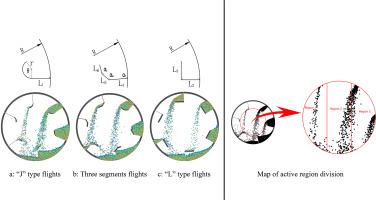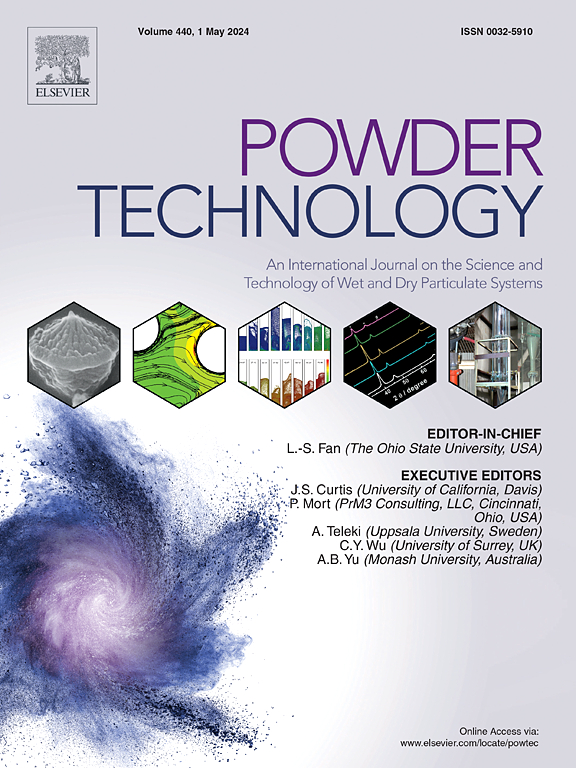Research on the design load of the flights of a rotary kiln based on thermal granular flow coupling
IF 4.5
2区 工程技术
Q2 ENGINEERING, CHEMICAL
引用次数: 0
Abstract
The rotary kilns are widely used in chemical, food and metallurgical industries, and the design load of the internal flights has a significant effect on the drying efficiency of the rotary kilns. The motion of granular flow and heat absorption process inside the rotary kilns were simulated by establishing a coupled CFD and DEM model. The average heat absorption rate of granules was proposed to simulate the “L” type and three segments flights, and the results showed that the average heat absorption rate of granules was in accordance with the conclusions of previous scholars. We used the average heat absorption method of granules to optimize the structural parameters of the “J” type flights design load, the best parameter was obtained, and then compared with the “L” type and three segments of the flights, we found that the drying efficiency of “J” type flights is the best, followed by three segments and “L” type is found to be the worst. At the same time, the active region was divided to explore the relationship between the area occupied by the granules in different regions and the average heat absorption rate of granules, and it was found that under the same shape of the flights, the larger the area occupied by the granules in region 2, the larger the corresponding average heat absorption rate of granules.

基于热颗粒流耦合的回转窑窑尾设计负荷研究
回转窑广泛应用于化工、食品和冶金行业,其内部飞行器的设计载荷对回转窑的干燥效率有重要影响。通过建立 CFD 和 DEM 耦合模型,模拟了回转窑内颗粒流的运动和吸热过程。提出了颗粒平均吸热率模拟 "L "型和三段飞行的方法,结果表明颗粒平均吸热率与之前学者的结论一致。我们利用颗粒平均吸热率法优化了 "J "型飞行器设计载荷的结构参数,得到了最佳参数,再与 "L "型和三段式飞行器进行比较,发现 "J "型飞行器的干燥效率最好,三段式次之,"L "型最差。同时,划分活动区域,探讨颗粒在不同区域所占面积与颗粒平均吸热率之间的关系,发现在相同的飞行形状下,区域 2 中颗粒所占面积越大,相应的颗粒平均吸热率也越大。
本文章由计算机程序翻译,如有差异,请以英文原文为准。
求助全文
约1分钟内获得全文
求助全文
来源期刊

Powder Technology
工程技术-工程:化工
CiteScore
9.90
自引率
15.40%
发文量
1047
审稿时长
46 days
期刊介绍:
Powder Technology is an International Journal on the Science and Technology of Wet and Dry Particulate Systems. Powder Technology publishes papers on all aspects of the formation of particles and their characterisation and on the study of systems containing particulate solids. No limitation is imposed on the size of the particles, which may range from nanometre scale, as in pigments or aerosols, to that of mined or quarried materials. The following list of topics is not intended to be comprehensive, but rather to indicate typical subjects which fall within the scope of the journal's interests:
Formation and synthesis of particles by precipitation and other methods.
Modification of particles by agglomeration, coating, comminution and attrition.
Characterisation of the size, shape, surface area, pore structure and strength of particles and agglomerates (including the origins and effects of inter particle forces).
Packing, failure, flow and permeability of assemblies of particles.
Particle-particle interactions and suspension rheology.
Handling and processing operations such as slurry flow, fluidization, pneumatic conveying.
Interactions between particles and their environment, including delivery of particulate products to the body.
Applications of particle technology in production of pharmaceuticals, chemicals, foods, pigments, structural, and functional materials and in environmental and energy related matters.
For materials-oriented contributions we are looking for articles revealing the effect of particle/powder characteristics (size, morphology and composition, in that order) on material performance or functionality and, ideally, comparison to any industrial standard.
 求助内容:
求助内容: 应助结果提醒方式:
应助结果提醒方式:


